We offer workshops on topics targeted towards archaeological research. Don’t hesitate to reach out if you have a request!
Upcoming workshops
Data management
Deidre Brin
Digital Archaeology Lab, Director
TBD
Do you feel like your spreadsheets are overwhelming and that there has to be a better way? In this workshop, we’ll cover fundamentals to managing your data, how to plan for collecting and working with various types of data, and what to consider when building out a database. During the hands-on portion, participants will practice creating data models to answer research questions and techniques for addressing common challenges surrounding data in cultural heritage work.
Email dal@ioa.ucla.edu if you have suggestions for additional workshop topics or are interested in being an instructor!
Past workshops
Recordings, when available, are accessible for past workshops using the links below.
Preparing graphics for publication
Lauren Pratt
Cotsen Institute of Archaeology, Postdoctoral Scholar
Friday, April 18, 2025 1:00 – 4:00pm (PT)
This workshop is intended for beginning to intermediate users of the statistics software R and will cover how to create data visualizations that can be used in publications. The exercises will also incorporate best practices for storing and working with your data to support analyses and creating graphics. The workshop will run for 3 hours and include hands-on exercises using sample data sets, as well as offering resources for further training.
R for Archaeologists
Lauren Pratt
Cotsen Institute of Archaeology, Postdoctoral Scholar
Friday, October 18th, 2024 2:30-5:30pm (PT)
This workshop is intended for beginning to intermediate users of the statistics software R, and will illustrate some of the ways data visualization and statistics in R can be useful in archaeological research. The workshop will run for 3 hours and include hands-on exercises using sample data sets, as well as offering resources for further training. A background in basic statistical concepts is helpful but not required.
Spatial Shenanigans I: ArcGIS Pro for Cultural Heritage Research
Deidre Brin
Digital Archaeology Lab, Director
This workshop will provide an introduction to working with spatial data in ArcGIS Pro, including how to manage files using the built-in catalog, understanding coordinate systems and projections, adding basemaps and points, and working with filters and styling options to present your data. Participants are encouraged to follow along on their own devices and will be given instructions for obtaining a free license through UCLA.
Spatial Shenanigans II: ArcGIS Pro for Cultural Heritage Research
Deidre Brin
Digital Archaeology Lab, Director
During this workshop participants will expand their familiarity with ArcGIS Pro and learn how to work with different types of data. Participants will practice georeferencing raster images (scanned documents), trace images to create polygons and lines, and perform analyses. The workshop will conclude with instructions on preparing maps for presentations and publications.
The Drone Days of Winter Series
This three part series will focus on hands-on experience with the drone available to Cotsen Institute affiliates. Two of the workshops have been postponed as the instructor navigates campus regulations to ensure that participants can get hands-on experience. The workshops are coming…view the training modules here in the meantime!
Flight Plans and Flying
Doug Daniels
Emerging Technologies Librarian
Data Science Center, UCLA Library
TBD
Learn how to make a flight plan that meets your research requirements, how to adjust the plan in the field based on real-life conditions, and get hands-on experience flying the drones. This workshop will take place in the UCLA Mildred E. Mathias Botanical Garden.
Data Processing
Doug Daniels
Emerging Technologies Librarian
Data Science Center, UCLA Library
TBD
Practice processing the data collected during the first session – both photogrammetric models and LiDAR. Learn how to utilize tools to classify LiDAR points, generate pointclouds and digital files that can be brought into GIS software, shared online, and deposited in repositories for preservation and publication. This workshop will take place in the Digital Archaeology Lab.
Drone Cinematography
Jewell Graham
Instructional and Emerging Technologies Consultant
BRIDGE Innovation Studio, Social Sciences Computing
Wednesday, February 21st, 2024 1:30 – 4:30pm (PT)
Learn how to capture engaging photographs and video footage of sites and activities using the variety of drones available to Cotsen affiliates. This workshop is for beginners and experience using a drone is not required. We’ll cover how to start getting cinematic footage with your drone, how to do it safely and legally, resources available as you continue learning, and some basic flight maneuvers.
Precision Photogrammetry and RTI for Cultural Heritage Research
Kylie Thomsen, NELC
Matei Tichindelean, Cotsen Institute of Archaeology
Friday, October 27th, 2023 1:00 – 4:00pm (PT)
Interested in incorporating photogrammetry and/or reflectance transformation imaging (RTI) into your research? This workshop will cover the underlying theory of photogrammetry so you can understand how it actually works as well as how to ensure that you are getting accurate models that can be used for taking measurements and making scholarly arguments. The second half will introduce when RTI would be a useful tool in your research and will include a demonstration of the process. This workshop will focus on object specific imaging techniques. Please answer the questions in the RSVP form below in as much detail as possible to help the instructors tailor the workshop content to your specific research goals.
This workshop assumes some familiarity already with photogrammetry but will provide an introduction and demonstration of RTI. You can view a recording of a previous workshop introducing photogrammetry on the DAL website here.
Practice with Photography and Photogrammetry
Anthony Caldwell, Assistant Director of the UCLA Digital Research Consortium
Friday, May 12th 2023 10:00am – 12:00pm (PT)
Photogrammetry, or Structure-from-Motion, is a technique for constructing three dimensional models from a series of photographs. This hands-on practice session will give participants the chance to practice taking photographs with DSLR cameras both for record shots as well as photogrammetic models. This practice session builds on a previous workshop which can be viewed here.
Remote Sensing #1: Preparations
Robin Meyer-Lorey, Anthropology
Doug Daniels, Emerging Technologies Librarian
Wednesday, May 31st 2023 9:00am – 12:00pm (PT)
This will be the first in a series of workshops on remote sensing technologies including LiDAR and photogrammetry from the initial planning stages through data processing and publication. We will start by covering how to select the appropriate type of data for your research project, planning for data collection, and how to identify and address the specific considerations or challenges that arise. Each participant will come out of this first workshop with an idea of what equipment and software they need as well as a detailed plan to meet their research goals. The contents of the workshop have been tailored towards the research projects described by interested participants.
PXRF Analysis: You’ve collected your data. Now what?
Vanessa Muros, Director of the Experimental and Archaeological Sciences Lab
Thursday, June 25th 2020 10:00am – 12:00pm (PT)
Portable x-ray fluorescence (XRF) spectroscopy has become a widely used analytical tool in the fields of archaeology and conservation for the non-destructive elemental analysis of cultural heritage materials. But once you’ve collected your data, how do you interpret it? This workshop will provide a general introduction to the three types of pXRF data that can be generated (qualitative, quantitative, and semi-quantitative) and through the use of case studies, illustrate how the data can be interpreted and used to answer research questions about cultural heritage.
Photogrammetry: Creating 3D Models from Photographs
Anthony Caldwell, Assistant Director of the UCLA Digital Research Consortium
Thursday, July 2nd 2020 10:00am – 12:00pm (PT)
Photogrammetry, or Structure-from-Motion, is a technique for constructing three dimensional models from a series of photographs. This technique can be utilized by archaeologists to record objects, features, and sites both quickly and relatively inexpensively. In this workshop, you’ll learn how to systematically photograph objects and the steps to processing these photographs into a 3D model with Agisoft’s MetaShape (previously named PhotoScan).
Statistics: Basic Data Management and Regression
Alan Farahani, Assistant Professor in Anthropology, University of Nevada, Las Vegas
Thursday, July 9th 2020 10:00am – 12:00pm (PT)
This workshop will cover the basics of contemporary data manipulation using the R statistical programming language as well as provide an introduction to approaches to regression for archaeological applications. Topics covered will include philosophy of regression, model specification, parameterization, and evaluation, as well as the different distribution families used to analyze count (poisson, negative binomial, etc.) and continuous (gaussian) data. Participants should walk away (aka turn off their web cameras) with at least a basic understanding of the issues as well the ability to undertake some of the analyses using the R platform.
Vector Illustrations with Adobe Illustrator
Deidre Brin, Digital Archaeology Lab
Thursday, July 16th 2020 10:00am – 12:00pm (PT)
Vector illustrations are common in archaeological publications and field documentation. In this workshop we’ll cover how Adobe Illustrator and vector illustrations can be used for site maps, trench and elevation drawings, and artifact renderings. Participants will be introduced to the interface and tools associated with these types of illustrations. We’ll cover how to bring scanned drawings into Illustrator and set up a drawing for digital tracing as well as tricks to speed up the process. Additionally, we’ll walk through creating artifact drawings using common techniques including stippling.
Introduction to 3D Digital Reconstructions using SketchUp
Anthony Caldwell, Assistant Director of the UCLA Digital Research Consortium
Thursday, July 23rd 2020 10:00am – 12:00pm (PT)
This workshop will introduce 3D modeling through the use of SketchUp, an intuitive modeling application that lets you create and edit 3D models. The workshop will cover: navigating and understanding 3D space, drawing basics, textures, tags, importing and exporting, and much more. Note: This workshop will be using Sketch-up free. If you would like to follow the workshop, please make sure you have signed up for a SketchUp free account at https://www.sketchup.com/plans-and-pricing/sketchup-free
Data Cleaning with OpenRefine
Deidre Brin, Digital Archaeology Lab
Thursday, August 6th 2020 10:00am – 12:00pm (PT)
Data are messy. Nearly all datasets require cleaning and processing before they can be analyzed and interpreted. This workshop will cover how to use the free, open-source tool OpenRefine to more quickly and easily understand and clean your data. Participants will learn how to correct typos and misspellings, standardize terms and dates, and break complex data into usable formats. We will also cover how to share your data and cleaning steps with collaborators and export a script that details the steps taken which can be applied to future datasets.
Go through the lessons yourself here!
Managing References and Citations with Zotero
Deidre Brin, Digital Archaeology Lab
Thursday, August 13th 2020 10:00 – 11:00am (PT)
This workshop will prevent headaches and save hours of work. The open-source tool Zotero not only makes gathering and organizing references fast and easy but also simplifies the process of adding citations and bibliographies to your publications. This workshop will cover how to add articles, books, chapters, periodicals, and web resources with a single click. Participants will also learn how to add in-text citations directly in Word and LibreOffice as well as adding and formatting a reference cited and bibliography to publications. Lastly, we will cover how to collaborate with colleagues and easily share research materials using Zotero libraries.
What’s possible with the Lux Lab? 3D scanning, printing, LiDAR and more!
Doug Daniels, Emerging Technologies Librarian
Thursday, August 27th 2020 10:00am – 12:00pm (PT)
Doug Daniels is the Emerging Technologies Librarian at the UCLA Library and director of the Library’s Lux Lab. The Lux Lab is a suite of emerging technology services, including 3D printing, 3D scanning, laser cutting and etching, large format printing, 3D mapping, and a developing VR service. This workshop will highlight some past work that the Lux Lab has done. These past projects reflect the diverse use-cases of these technologies in an archaeological context. Immediately following the presentation, a live demonstration of the Lux Lab’s 3D scanner(s) will take place, with plenty of time for questions and answers.
Academic Publishing in Archaeology
Aaron Burke (CIoA Press Editor in Chief), Randi Danforth (Publications Director), and Deidre Brin (Digital and Data Publications)
Thursday, September 3rd 2020 10:00am – 12:00pm (PT)
CIoA Press Editor in Chief Aaron Burke and Publications Director Randi Danforth will present a session on academic publishing in two parts. First, “how do I decide where to publish something? Who should I publish it with? Should it be an article or a book?” This presentation will provide an overview of the publication process with advice concerning how to approach publishers, select journals, prepare proposals and manuscripts, respond to and address peer review, and promote your work once published. Part Two will present an inside look at the process, from book proposal to board review to acceptance and production (copyediting, author review, design, printing, and distribution). Deidre Brin will give an overview of electronic publishing possibilities, both those linked to a book in print, and those in independent digital forms.
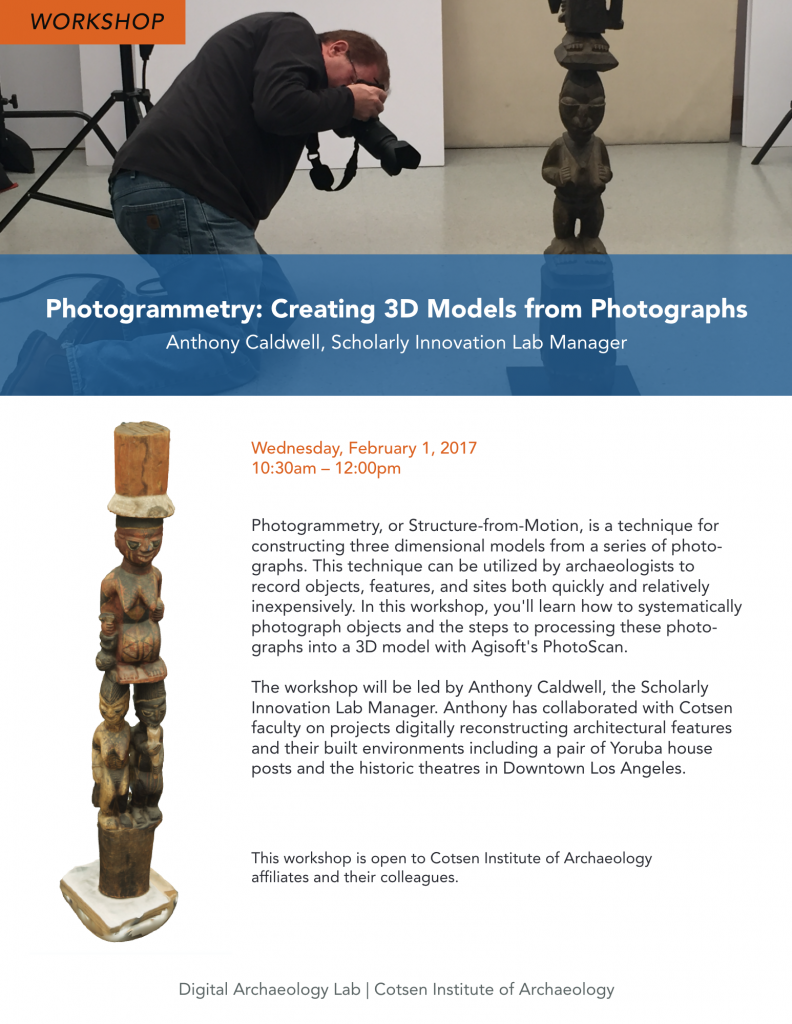
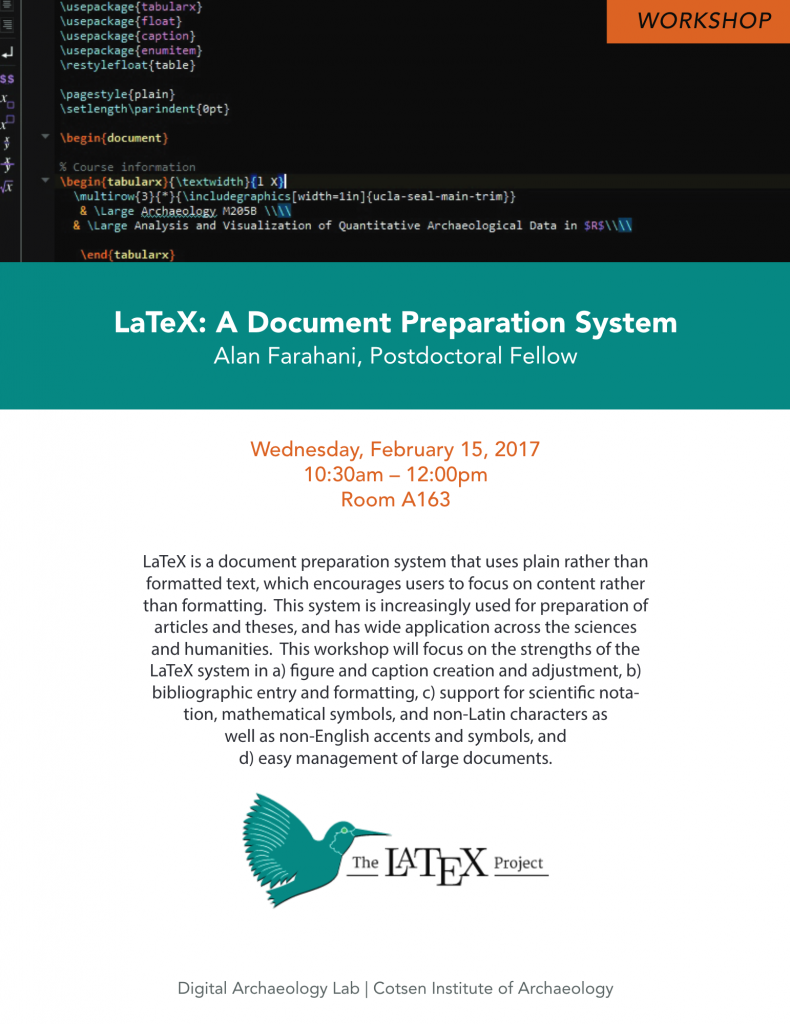
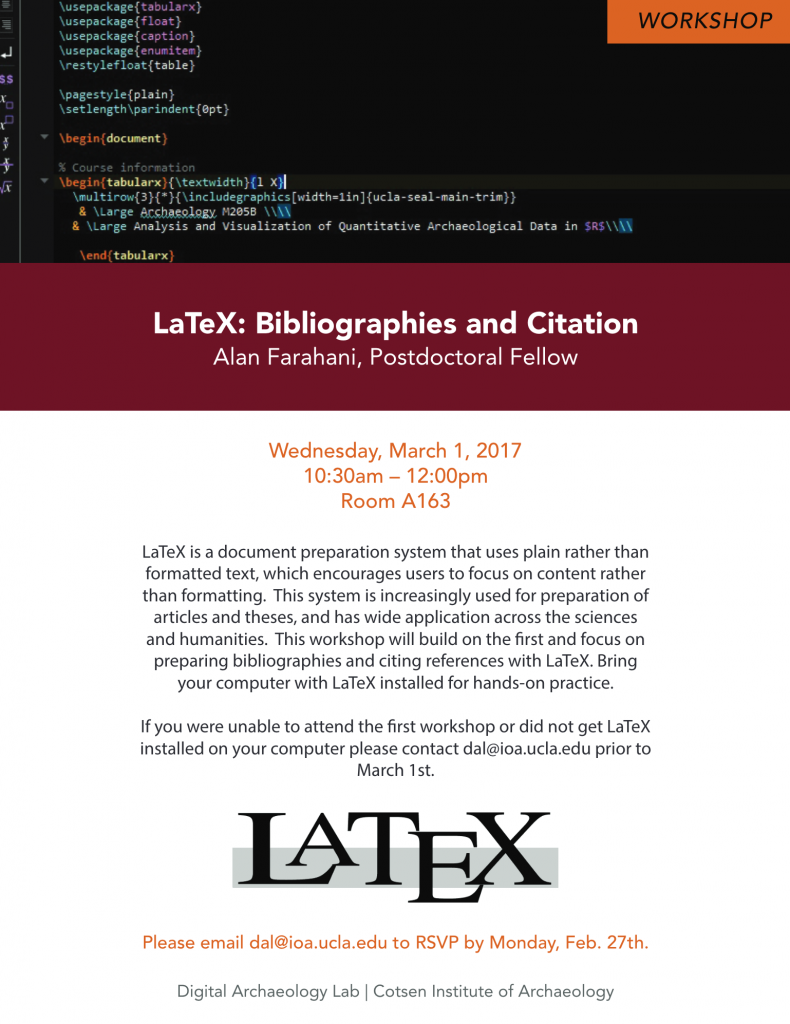
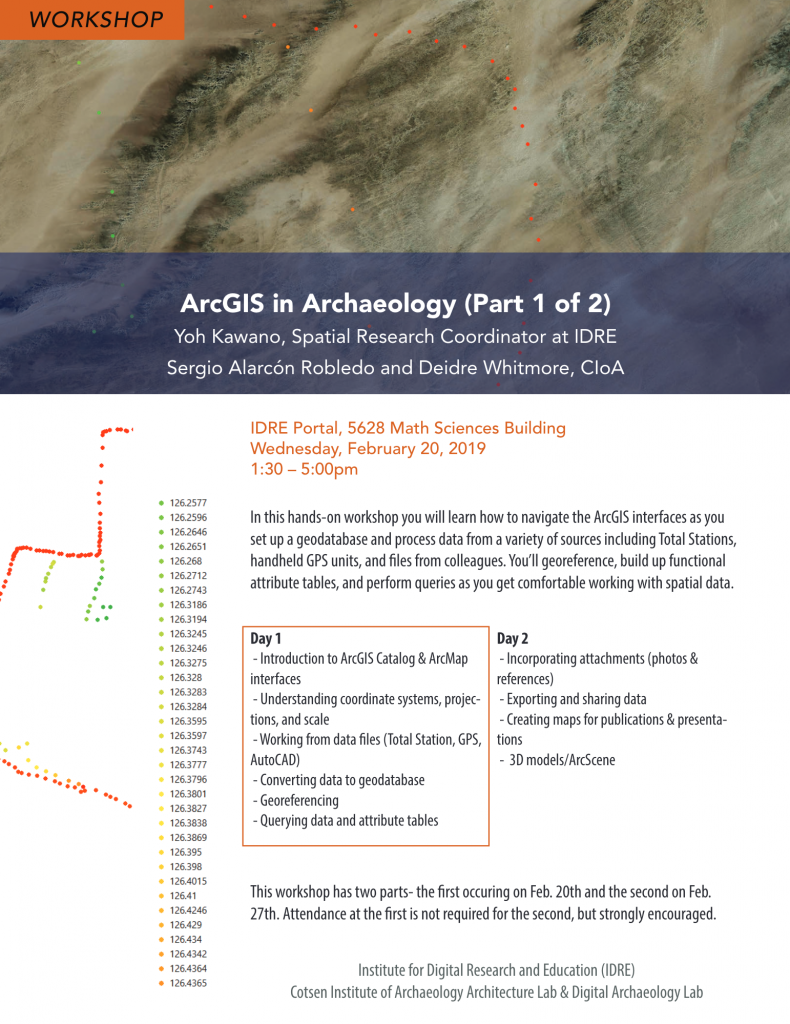
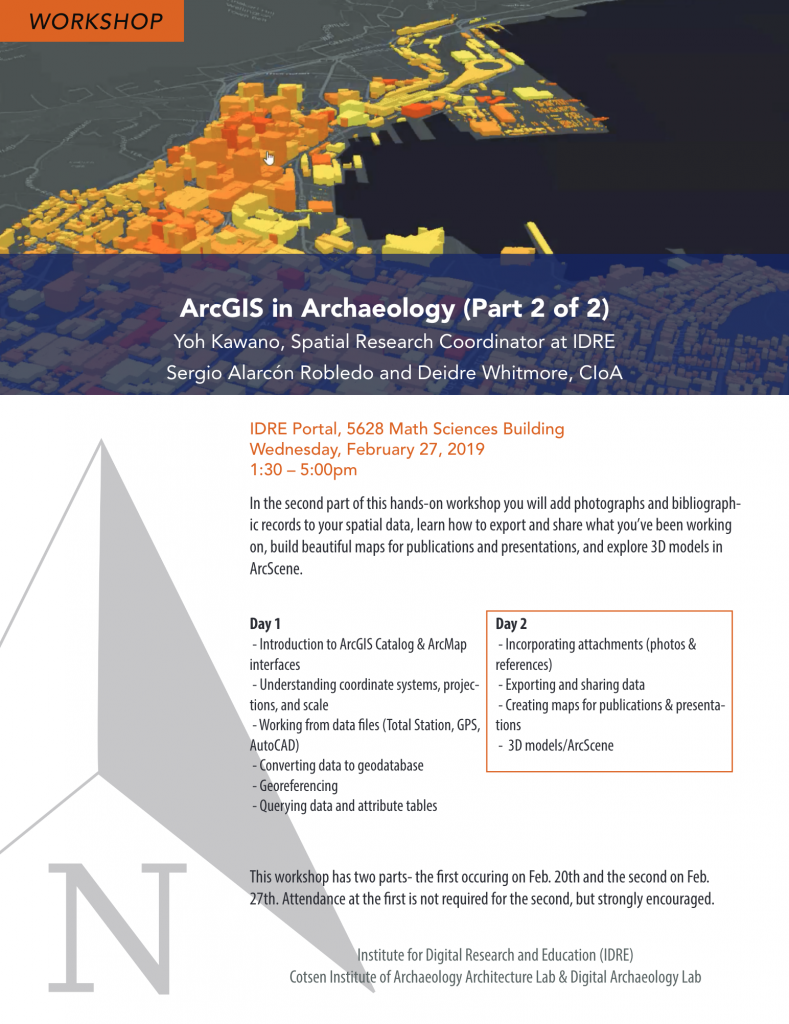
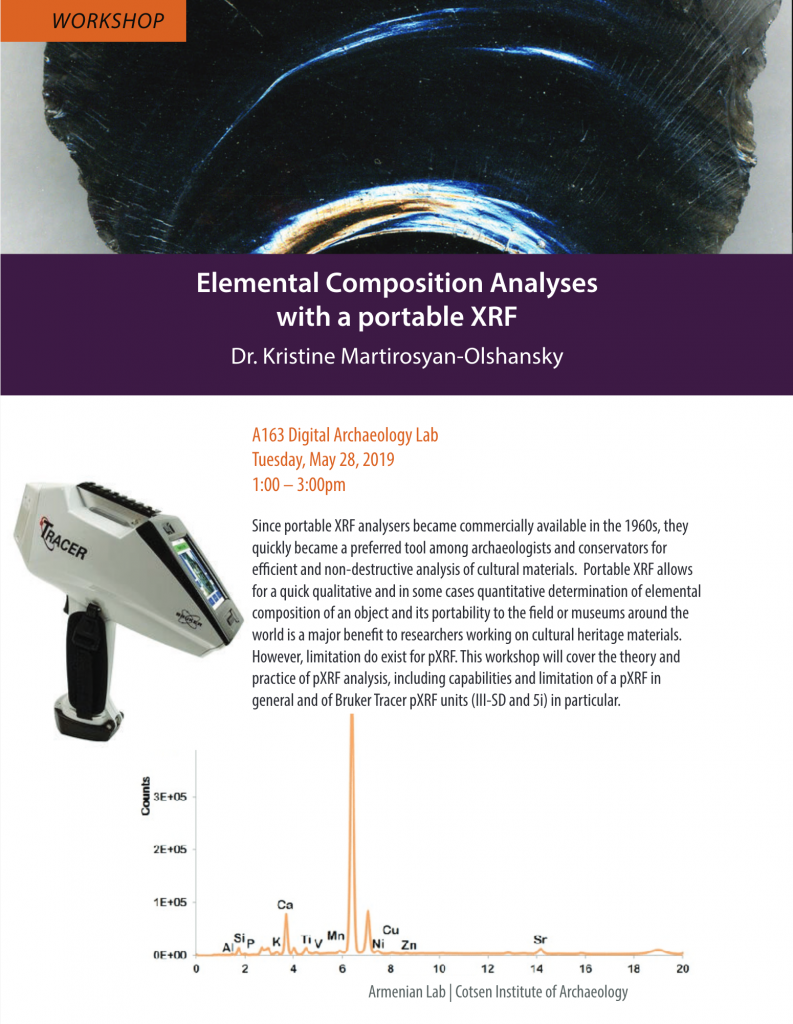
In addition to DAL workshops, we regularly collaborate with the UCLA Library Research Partnerships team, the Data Science Center, IDRE Sandbox, and other units across campus to offer a variety of workshops focusing on fundamental skills and tools that you can apply on your research projects.
